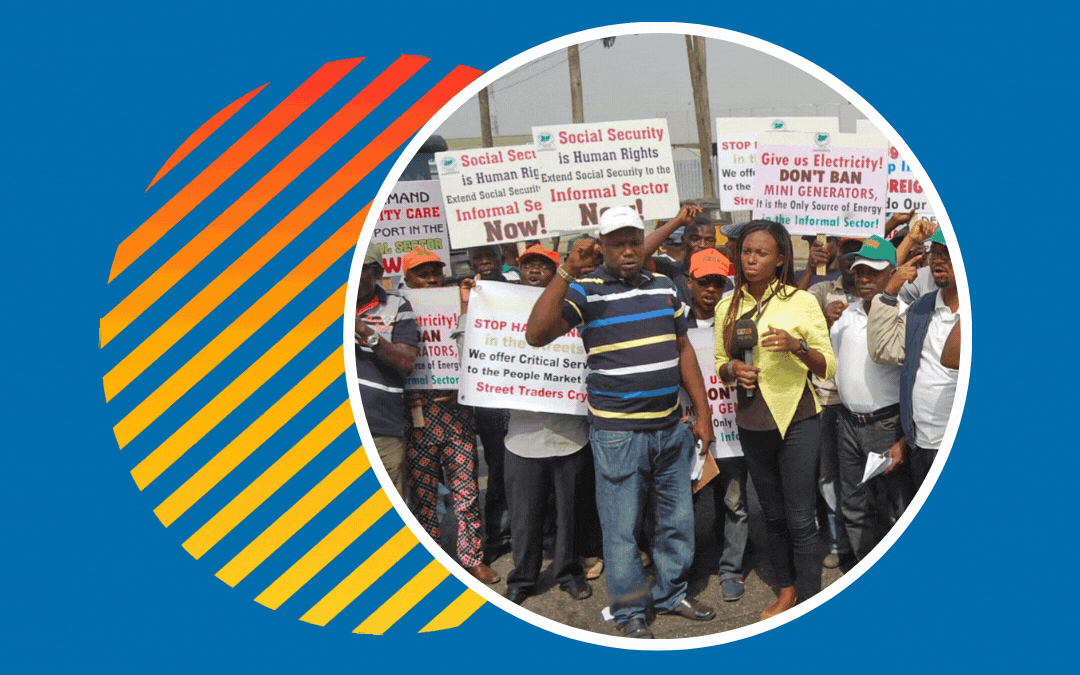
Oct 6, 2021
Worldwide, 2 billion workers perform essential work selling goods in street markets, driving taxis or cleaning homes. The vast majority of these jobs are low wage, with no security and no paid sick leave or health care.
In Nigeria, where more than 80 percent of the population works in informal economy jobs, these workers are joining together to fight for their right to decent work through the Federation of Informal Workers’ Organizations of Nigeria (FIWON), a nationwide association with hundreds of branches across the country.
On the first Solidarity Center Podcast this season, Solidarity Center Executive Director and podcast host Shawna Bader-Blau talks with Gbenga, FIWON founder and general secretary. Gbenga describes how informal economy workers are using their collective power, building coalitions with allied organizations and making key gains, like ending evictions during the COVID-19 pandemic, addressing unfair, burdensome taxation on vendors and, importantly, winning recognition by government and society that they must have the same rights and respect as all workers.
“Poor working people must have access to basic social security, but it doesn’t start with that,” says Gbenga, who goes by one name. “It starts with even the right to work without fear. The right to work without harassment and unnecessary molestation. The right to access public spaces as commonwealth, as something that belongs to all of us.”
Tune In to The Solidarity Center Podcast!
Listen to this and all Solidarity Center episodes here or at iTunes, Spotify, Amazon, Stitcher, Castbox or wherever you subscribe to your podcasts.
The Solidarity Center Podcast, “Billions of Us, One Just Future,” highlights conversations with workers (and other smart people) worldwide shaping the workplace for the better.
Check out recent episodes of The Solidarity Center Podcast.
This podcast was made possible by the Ford Foundation and the generous support of the American people through the U.S. Agency for International Development (USAID) under Cooperative Agreement No.AID-OAA-L-16-00001 and the opinions expressed herein are those of the participant(s) and do not necessarily reflect the views of USAID/USG.
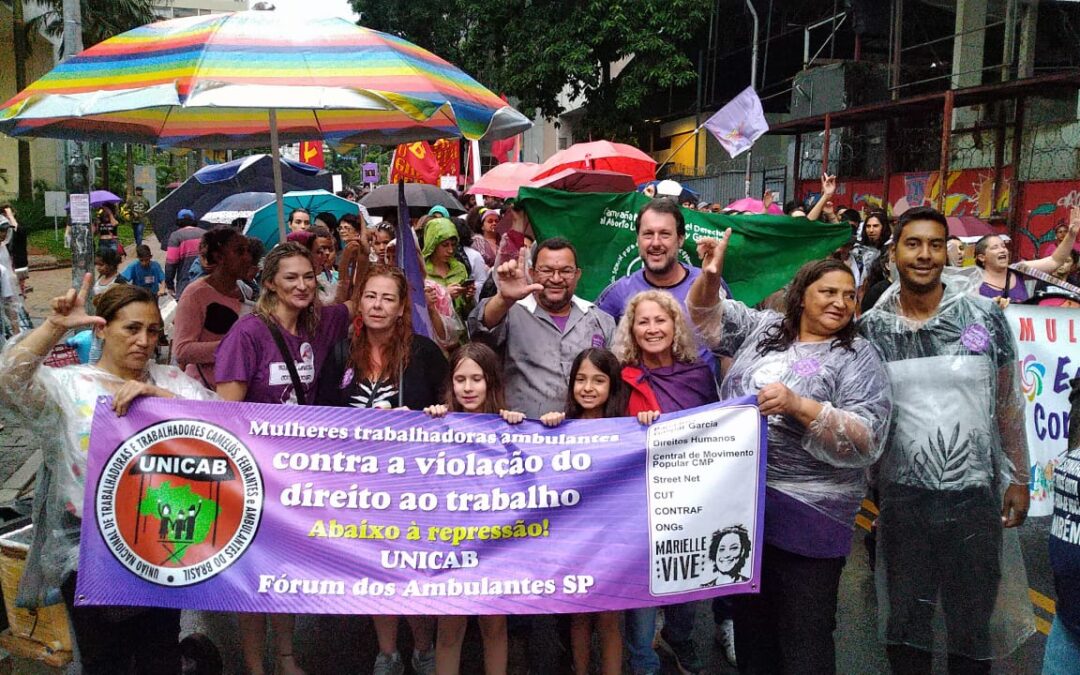
Oct 4, 2021
Millions of street vendors worldwide lost their livelihoods nearly overnight during the pandemic, unable to sell in open markets during lockdowns or unwilling to risk their health to do so.
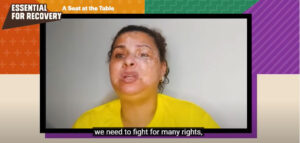
Maria do Carmo, founder of United Camelôs Movement street vendor association in Sao Paulo, spoke at the Essential Worker Summit.
But street vendors in Brazil, through the National Union of Street Vendors Workers (UNICAB), achieved basic emergency income to ensure they could survive. UNICAB went on to collect sufficient signatures from members of the Brazil National Congress to create a Parliamentary Front to defend informal traders’ rights, marking the first time they will be represented at the national level.
“We had many successes this year during the pandemic,” says Maria do Carmo, a street vendor and leader of the United Camelôs Movement (MUCA) in Rio de Janeiro. MUCA, organized by do Carmo in 2003, has further built its collective strength by joining UNICAB, a countrywide association formed in 2014.
Do Carmo says she is most proud of MUCA’s victory in convincing city officials to not charge customary fees during the pandemic because vendors sold so little. “We did it with a lot of protest—going to the town hall and participating in public debate.
“A good success is a collective one.”
Building Success Through Collective Action
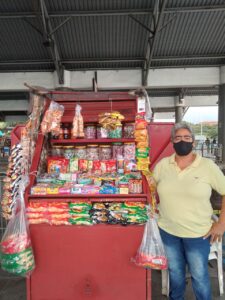
Marli Almeida is among many street vendors in Brazil seeking basic rights on the job. Credit: UNICAB
In September, informal economy workers joined in a first-of-its-kind worldwide gathering to outline a vision for a just economic recovery that ensures protections for workers and advances worker rights. Over three days, the Essential For Recovery summit brought together well-known actors, global union leaders and policymakers who talked with street vendors, domestic workers, farm workers and others who shared their experiences and demanded a response that urgently and effectively protects the most marginalized.
Many Essential For Recovery participants pointed to workers joining together in unions and associations as one of the most effective means for achieving rights. In Rio, do Carmo and other street vendors further showed the power of collective action during the pandemic when they successfully lobbied the municipal government to stop police from confiscating vendors’ merchandise as means of harassment.
“After MUCA joined UNICAB, we saw we had more presence, we are more respected in the state [of Rio] because of strength of UNICAB,” she says. Through the organization, street vendors connect with each other across the country, learn about available resources and join together to advocate for their rights at the local and national levels. (Check out UNICAB’s podcast with street vendors, in Portuguese).
Street Vendors Part of Growing Informal Economy
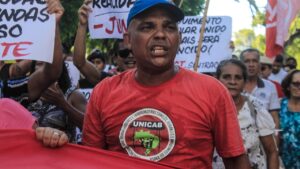
Edivaldo, a member of the Sintraci Informal traders trade union of Recife Pernambuco, protests violence against street vendors. Credit: UNICAB
Street vendors are part of the global economy’s vast and growing informal workforce—61 percent of all workers are in the informal economy, where they rarely have paid sick leave, safe jobs or access to affordable health care. Street violence—especially from police and other local officials—is the biggest problem they face in Brazil and worldwide, says Maira Villas-Bôas Vannuchi, organizer of StreetNet International for the Americas. Street vendors, the majority of whom are women in many countries, are especially vulnerable, exposed to extreme heat or cold, often with no access to toilets or clean water.
“Many women, single mothers, had to go work in the streets because that was the option they had,” says do Carmo.
Two weeks after giving birth, Maria do Carmo returned to the streets of downtown Rio, where she sells women’s clothes. The police, who street vendors there say regularly abuse them verbally and physically, assaulted do Carmo.
“They beat me up pretty hard,” she says. “I was injured and had to take leave from work.”
It took do Carmo a month before she was healed sufficiently to return to her job, but when she did, she was determined to fight for the rights of street vendors to make a living. Do Carmo went on to organize street vendors across the city in MUCA.
“Street vendors are workers without rights,” says Vannuchi. “They work every day, they contribute to the economy of the country, but they are not recognized as workers.”
Respect, Recognition
Connecting with and organizing street vendors who work on different days and at varied hours spread across cities and along roads was challenging—and involved many arrests as local officials sought to disrupt their efforts to gain political and social rights, with police targeting leaders like do Carmo. MUCA and UNICAB are now part of StreetNet International, a global alliance of street vendors launched in South Africa in 2002.
Do Carmo ran for office in Rio and although she did not win the election, she says the visibility of her campaign and the efforts of other vendors to win office brings their issues to the attention of the public and lawmakers. “Today we have respect from City Hall,” she says.
A single mother, do Carmo has supported four children with her work and plans to remain a street vendor, despite her organizational involvement and efforts to seek elective office. She emphasizes that street vending is a job many want and need to do—but in decent conditions and with respect.
“A good future will be a future when street vendors—all of them—have confidence in the value of their work, when society considers what we do is work and when our work is appreciated by society, and we are not marginalized as we are now.”
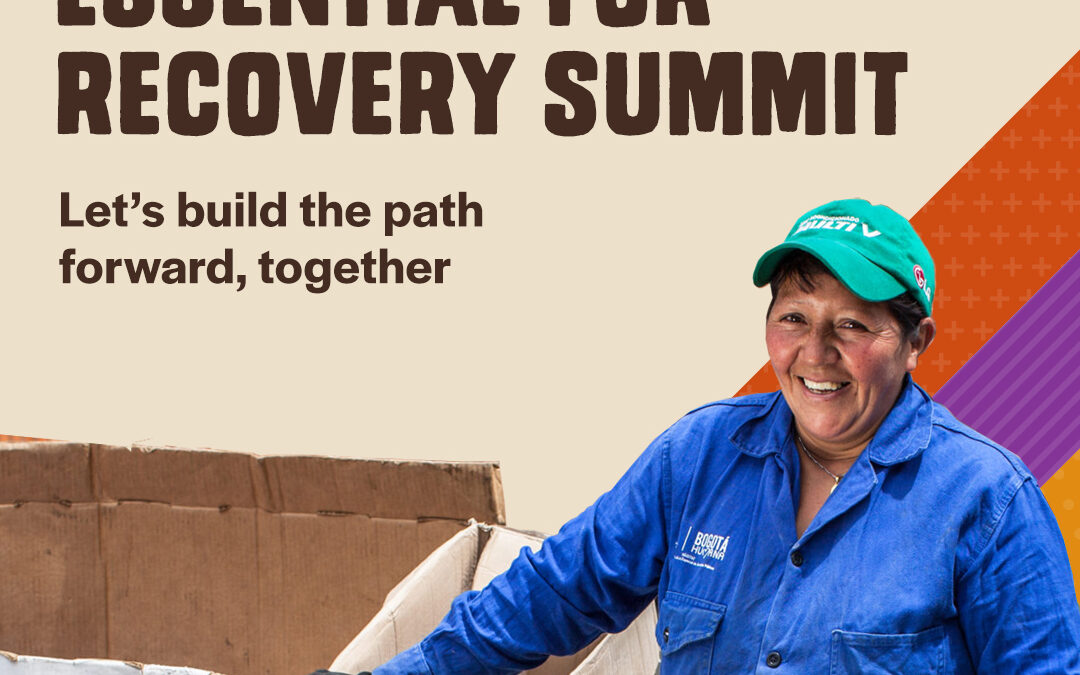
Sep 14, 2021
Workers who risked their health to provide essential services during the pandemic joined with actors, global union leaders and policymakers in a first-of-its-kind worldwide gathering to share their experiences and demand a response that urgently and effectively protects all people, and especially the most marginalized.

Yalitza Aparicio spoke in support of government action to ensure essential workers have decent wages and safe work.
“COVID-19 has taught us about the importance of workers in all sectors and recognize that they deserve dignified work and they are important in the world economy,” said actor Yalitza Aparicio. “Governments know about this. But, what are they doing about it?” Aparicio was among dozens of speakers during the September 8–10 Essential For Recovery virtual summit who pointed to the need for action to ensure decent wages, rights and social protections like paid sick leave so workers deemed “essential” during the pandemic will not be left behind after the crisis passes.
As the Summit made clear, essential workers often work in the informal economy. “They have no rights, no minimum wages, no rule of law, no social protection,” said Sharan Burrow, general secretary of the International Trade Union Confederation (ITUC). “We have to get a minimum living wage to all essential workers. We have to afford them collective bargaining rights. And we have to put in place universal social protection in safe workplaces.”
Organized by the Open Society Foundations and hosted by actor Sophia Bush, Essential For Recovery focused on four themes: increased income and improved working conditions; healthy and safe workplaces and access to health care; social protection benefits and support for vulnerable workers; and ending gender-based violence and harassment at work.
The Solidarity Center co-sponsored the event, along with HomeNet International, ITUC, StreetNet International Alliance of Street Vendors, UNI Global union and WIEGO.
Catch the full three one-hour sessions:
Unions, Collective Action Key to Building Back Better
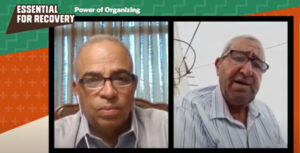
Mithqal Zinati (right), a coordinator for Jordan’s agricultural sector, says workers need the right to form unions to ensure safe workplaces.
In Jordan, where workers have limited rights to form unions, Mithqal Zinati, a coordinator for the country’s agricultural sector, says the government’s action “keeps thousands and tens of thousands of workers from being part of providing solutions to the problems facing the agriculture sector. This eliminates the role of workers to defend their rights and protect their interests and to see beneficial gains.
“For everyone, having a union is very beneficial. For farmers and for workers at the same time.”
As the pandemic highlighted, workers with unions often more readily had access to personal protective equipment (PPE) and decent wages. Summit participants discussed the power of grassroots organizing to improve workers’ lives, and described how, over the last year, essential workers in the formal and informal economies went on strike to win access to PPE and vaccines. They took to the streets and to social media to demand more democratic societies and governments.
Maria do Carmo, a Brazilian street vendor, organized street vendors into a nationwide organization, the National Union of Hawkers, Street and Market Vendor Workers of Brazil (UNICAB), and through their collective power, raised awareness of their issues with politicians. “Today we have respect from City Hall,” she said.
“Over the past two days, we’ve seen proof of the effectiveness of collective action, and of the importance of eliminating gender inequities. But at the heart of it all is power,” said Bush, at the start of the third and final session.
Women Targets of Gender-Based Violence, Burdened with Carework
The pandemic also forced many to work from home where women disproportionately engaged in care work. Globally, women lost $800 billion in income due to COVID-19.
Mercedes D’Alessandro, the first national director of Economy, Equality and Gender in Argentina, described a study in which she found that during the pandemic, three-quarters of women did unpaid care work, amounting to 22 percent of GDP—up from 16 percent of GDP before COVID-19.
“The truth is that the increase in time that women dedicate to care activities means also a smaller opportunity to go out and look for a job, continue with their jobs, develop their careers or study, graduate from university,” she said.

Shirley Pryce, president of the Jamaica Household Workers Union, urges governments to ratify a treaty ending gender-based violence at work.
Women also experienced high levels of violence during lockdowns, further highlighting the need for governments to ratify an International Labor Organization (ILO) treaty (Convention 190) to end gender-based violence at work.
“Violence and harassment can happen anywhere, and it can happen to anyone,” said Shirley Pryce, president of the Jamaica Household Workers Union. “But this must not be tolerated. It must stop. Let us push together for governments to ratify this very important convention.”
C190 covers wherever work is performed, such as where workers take a rest break or meal or use sanitary, washing or changing facilities, and includes commuting to and from work.
“We are seeing a new normal. Home has become a workplace,” said Rose Omamo, general secretary of the Amalgamated Union of Kenya Metal Workers, a Solidarity Center partner. Employers must ensure workers have what they need to work from home, including safe workplaces, she said.
Building to a Better, More Equitable Tomorrow

Artists like Sinkane performed during the Essential Worker Summit.
Omamo was in conversation with Rosa Pavanelli, general secretary of Public Services International. The summit provided opportunities for shared discussion, “lightening rounds” featuring workers telling their stories and urging action, and videos showcasing worker issues such as the Tunisian General Labor Union (UGTT)’s documentary on women agricultural workers seeking safer transportation.
Essential for Recovery also featured multimedia presentations by performance artists such as Khansa, a singer, songwriter and dancer from Lebanon; U.S. actor Martin Sheen; Sonam Kalra of the Sufi Gospel Project; and Ahmed Abdullahi Gallab Sinkane, a Sudanese-American musician.
“I stand with all essential workers around the globe. The domestic and agricultural workers, waste pickers, street vendors, caregivers and home-based workers who make our world run,” said Sinkane, before performing U’Huh.
“During the pandemic, we saw how essential they really are. They deserve a living wage, proper employment conditions and a safe and healthy workplace,” he said. “Let’s build forward to a better, more equitable tomorrow.”
Key participants in Essential For Recovery also included Christy Hoffman, UNI Global Union general secretary; Maina Kiai, former United Nations Special Rapporteur on the rights to freedom of peaceful assembly and of association; Guy Ryder, ILO director general and Ai-jen Poo, National Domestic Workers Alliance executive director.
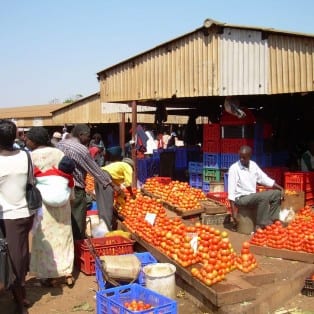
May 18, 2020
Among the world’s most vulnerable workers are those marginalized within their economies and societies, namely the women and labor migrants who predominate in the informal economy, where they perform valuable work in low-wage jobs as janitors, domestic workers, agricultural workers, home healthcare workers, market vendors, day laborers and others. Today, many of these workers are on the coronavirus front lines, risking their health without benefit of paid sick leave, COVID-19 relief programs or personal savings. Others are working where they can, if they can, to survive.
Although more than 2 billion workers globally make their living in the informal economy and can create up to half of a country’s GDP, they have limited power to advocate for living wages and safe and secure work, and never more so than during the current pandemic when informal-sector workers are disproportionately falling through the cracks. Due to the failure of governments to build systems of universal social protection, the world is facing the pandemic with 70 percent of all people lacking a safety net, says International Confederation of Trade Unions (ITUC) General Secretary Sharan Burrow. Also, despite their vast numbers—61 percent of the world’s workers work in the informal economy and, in developing countries, that number can rise to 90 percent of a country’s workforce—informal-sector workers are consistently overlooked by legislators and policy makers for economic assistance and legal protections during the current crisis.
A new brief from the UN’s International Labor Organization (ILO) warns that workers earning their livelihoods in the informal economy in 2020 are being forced “to die from hunger or from the virus” and offers a raft of immediate, medium- and long-term recommendations for governments and employers’ organizations to address the crisis. Without urgent action, quarantine threatens to increase relative poverty levels in low-income countries by as much as 56 percentage points, according to the brief.
The far-reaching effects of the coronavirus pandemic have expanded global calls for a new social contract by worker rights organizations that are championing a “build back better” campaign as well as by some businesses that recognize the unsustainability of economic and social structures in which workers absorb the burdens of our economies but not the benefits.
Unions and worker rights activists are stepping into the breach, giving voice to workers’ struggles during lockdown, providing relief where resources allow and banding together to urge governments to provide financial and other social support for informally employed workers, as well as protection from harassment.
- The Central Organization of Trade Unions-Kenya (COTU-K) distributed protective gear, such as masks, gloves, soap and hand sanitizer to workers before shops were closed, and has met with the Kenyan government to lobby for support for informal workers, who comprise some 80 percent of the workforce.
- In Zimbabwe, informal economy association ZCIEA is giving voice to vendors’ struggle for survival under quarantine and advocating for their right to operate. In Harare, even though markets are legally open and deemed essential for citizens to secure food, ZCIEA Chitungwiza Territorial President Ratidzo Mfanechiya says that ZCIEA has had to intervene with the town manager, town council and local police to protect Jambanja market vendors’ right to operate free of harassment and forced removal during the five-week lockdown. She is also speaking out against gender-based violence, given that many women are reporting incidents of abuse while trapped at home with partners during lockdown.
- The Alliance Against Violence & Harassment in Jordan, a Solidarity Center partner, is urging the government to grant assistance to migrant workers, who have little or no pay but cannot return to their country of origin. The Alliance also asks for safety gear for migrant workers still on the job. The domestic workers solidarity network in Jordan shares information on COVID-19 and its impact on workers in multiple languages on its Facebook page.
- Leaders of multiple women’s worker rights movements banded together in May to make a joint call on the world’s governments to collaborate at all levels with domestic workers, street vendors, waste pickers and home-based workers during the COVID-19 crisis so that some of the world’s most important systems traditionally propped up by informally-employed women—including food supply, the care economy and waste management—are preserved.
- In India, where an estimated 415 million workers, or 90 percent of the country’s total workforce, toiled in informal-sector jobs in 2017–18, trade unions lobbied Labor Minister Santosh Gangawar for income support and eviction support for more than 40 categories of informal workers hit by the coronavirus pandemic.
In 2018, the workforce in informal employment in Africa was 86 percent; in Asia and the Pacific and the Arab states, 70 percent; in the Americas, 40 percent; and in Europe and Central Asia, 25 percent.
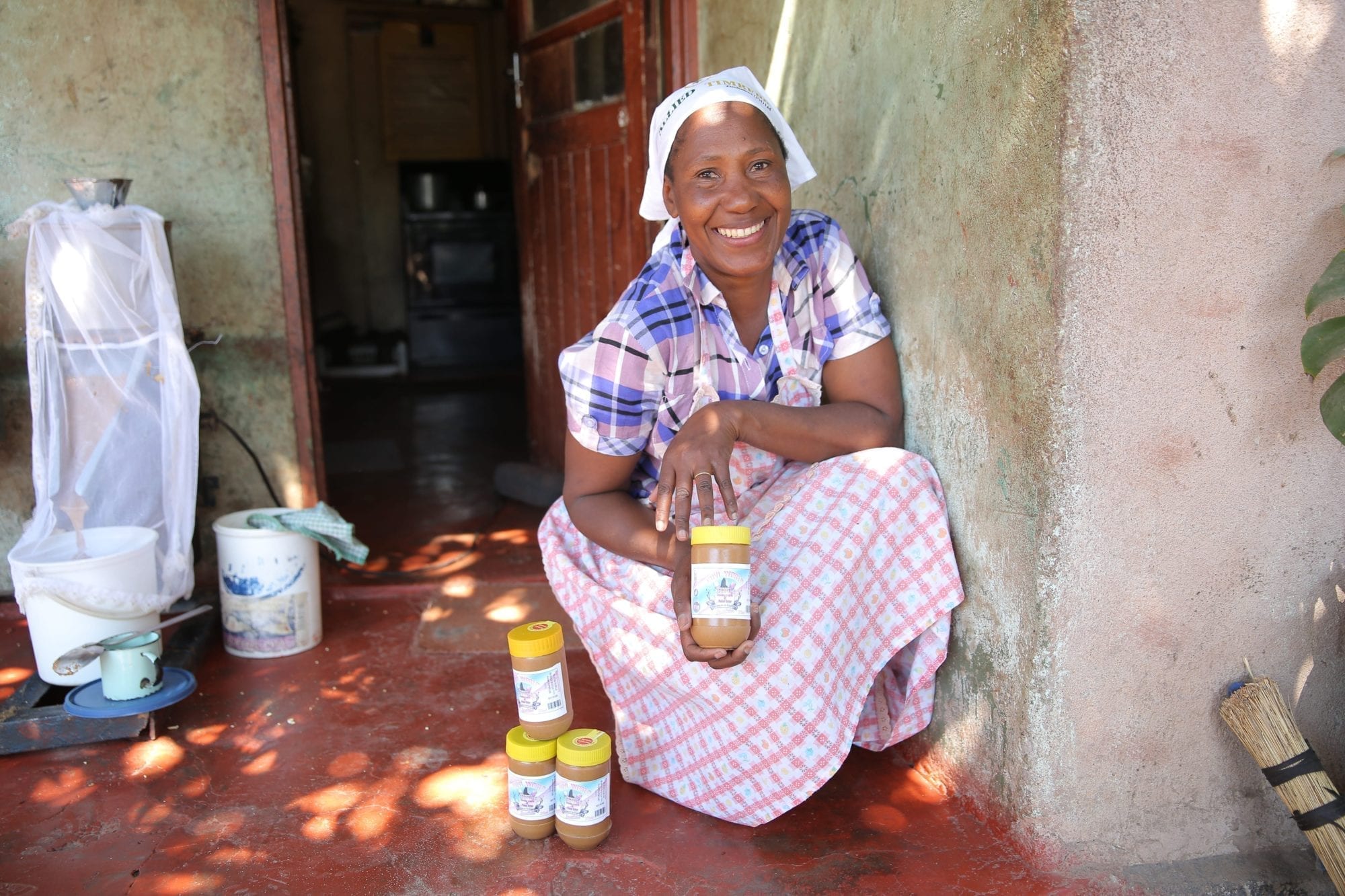
Feb 7, 2020
Taxi drivers in Ghana, tortilla vendors in Honduras and Asian domestic workers in countries across the Gulf region—all are part of the world’s informal economy, comprising 2 billion workers or 61 percent of the global workforce.
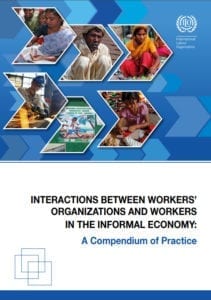 Although informal economy workers create more than one-third of the world’s gross national product, most are either not covered or insufficiently covered by laws or working arrangements guaranteed to formal workers, and have little power to advocate for living wages and safe and secure work.
Although informal economy workers create more than one-third of the world’s gross national product, most are either not covered or insufficiently covered by laws or working arrangements guaranteed to formal workers, and have little power to advocate for living wages and safe and secure work.
But by joining in unions or other worker associations, workers in the informal economy can gain the collective power they need to make change, according to a new International Labor Organization (ILO) study.
“Interactions Between Workers’ Organizations and Workers in the Informal Economy: A Compendium of Practice,” highlights 31 examples of how unions around the world have reached out to workers in the informal economy, improved their working conditions, and supported their transition into the formal economy.
“Most people enter the informal economy not by choice but as a consequence of a lack of opportunities in the formal economy and the absence of other means of livelihood,” according to the ILO’s 2015 Transition from the Informal to the Formal Economy Recommendation (No. 204). “The transition to formality is essential for inclusive development and decent work for all.”
Collective Power for 100,000 Zimbabwe Informal Economy Workers
The vast majority of workers in Africa, nearly 86 percent, depend on the informal economy to make a living.
While globally, more men (63 percent) than women (58 percent) work in informal employment, in regions such as sub-Saharan Africa, the reverse is true. In Africa, nearly 90 percent of employed women are in informal employment compared to 82 percent of men. Women working in the informal economy are often in more vulnerable situations than their male counterparts, for example, as domestic workers who labor in private homes away from the public.
In Zimbabwe, where the proportion of informal employment is more than 94 percent of total employment (including agriculture), the Compendium of Practice explores how the Zimbabwe Congress of Trade Unions (ZCTU), undertook a pathbreaking partnership with informal economy workers to advocate for legal changes that would improve their working conditions and livelihoods.
In 2002, ZCTU, a Solidarity Center partner, joined with the Employers Confederation of Zimbabwe and the Ministry of Labor to form the Zimbabwe Chamber of Informal Economy Associations (ZCIEA). The association now has 30 territories, each with between five and 10 chapters of 500 informal economy members each. As of 2019, there were 100,000 members in 150 associations.
Market Vendors Harassed, Bullied by Authorities
One of the key challenges informal economy workers face in Zimbabwe is harassment and criminalization of the informal economy. Most informal workers often lack the required licenses to operate, which often cost more than they can pay or only can be procured in cities hundreds of miles from where they live.
As a result, informal workers report widespread harassment and bullying by authorities. In a 2016 ZCIEA survey, 81 percent of 514 informal workers said they have been bullied, with 22 percent specifying that the harassment involved both confiscation of goods and threats of violence. Some 36 percent noted the source of harassment stemmed both from the local authorities and the Zimbabwe Republic Police, the national police force of Zimbabwe.
In highlighting the Zimbabwe example among its case studies, the Compendium of Practice points to how ZCIEA has negotiated for and come into agreement with various local government authorities on new approaches, such as reviewing laws to regularize informal workers.
“ZCIEA has increased the engagement of informal economy workers in policy discussions,” according to the study.
Working with partners like ZCTU throughout the world, Solidarity Center provides trainings and programs to help informal economy workers better understand their rights, organize unions to mitigate job vulnerabilities, and learn to bargain for improved conditions and wages. We connect workers with unions, legal services and pro-worker organizations to challenge exploitation.













 Although informal economy workers create
Although informal economy workers create